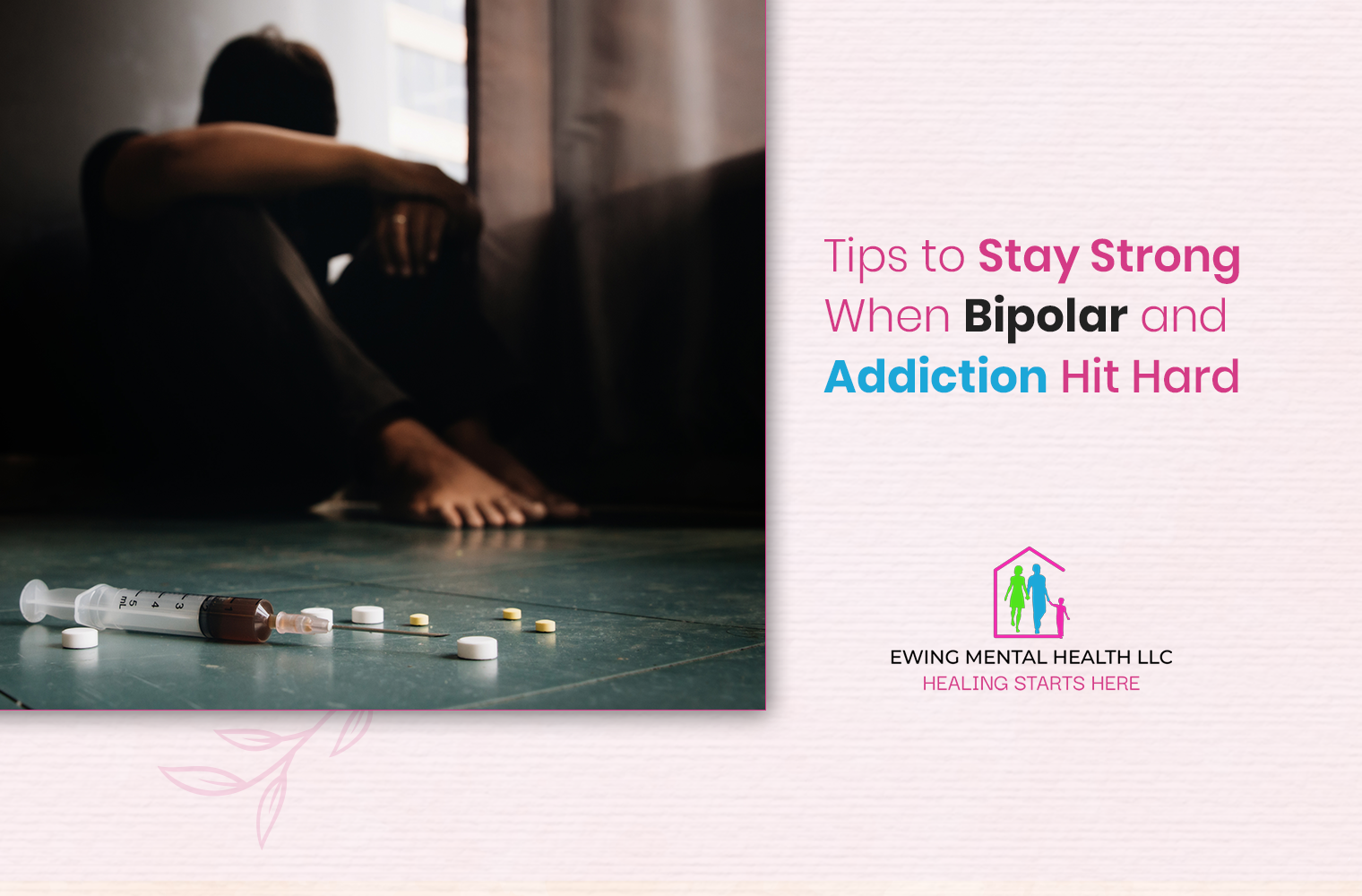Life throws curveballs. When bipolar disorder and addiction hit together, it can feel like a storm inside your mind and body. This mix is sometimes called dual diagnosis. It’s heavy.
But you can find your footing. You are not alone, and with the proper support, healing is not just possible, it’s within reach.
At Ewing Mental Health LLC, we specialize in evidence-based and compassionate care that will help you take control of your life back.
Below, we will outline how to stay strong and build a life that feels hopeful again, one small step at a time.
7 Simple Tips to Stay Strong When Bipolar and Addiction Feel Overwhelming
You Aren’t Alone: The Power of Connection
Bipolar and addiction feed on isolation. Your brain might whisper, “Hide.” Fight that urge. Reach out.
- Talk to Safe People: A family member, friend, or support group. Just saying, “I’m struggling,” lifts weight.
- Find Your Tribe: Groups and supportive therapists can provide powerful validation. Hearing “Me too” breaks the shame.
- Protect Your Energy: Avoid people who use substances or judge your mental health journey.
At Ewing Mental Health, we believe in building relationships that restore hope. You deserve a team that truly listens.
Team Up with Professionals
Trying to handle a dual diagnosis alone is like climbing a mountain barefoot. Experts can give you tools:
- Find a Dual-Diagnosis Specialist: They understand how bipolar and addiction twist together.
- Therapy that Works: Cognitive Behavioral Therapy (CBT) helps spot triggers. Dialectical Behavior Therapy (DBT) teaches coping skills for intense emotions.
- Medication Support: Mood stabilizers for bipolar, plus treatments for addiction (like naltrexone). Always work with your doctor!
Our expert team at Ewing Mental Health offers comprehensive medication management and psychiatric follow-ups that are always customized to your needs.
Routine: Your Secret Weapon
Chaotic moods and cravings can make you feel out of control. A gentle routine helps add calm.
- Sleep like It’s Medicine: Go to bed and wake up at nearly the same time every day. It helps to stabilize your moods if you have bipolar disorder.
- Move Your Body: Walk, stretch, and exercise for 10 minutes a day. Exercise eases anxiety and improves mood.
- Eat Regularly: Skipping meals worsens mood swings. Try simple meals (oatmeal, eggs, fruit).
Routine isn’t about perfection. It’s about giving your day bones to lean on. At Ewing Mental Health, our providers can work with you to design a sustainable lifestyle that supports your recovery goals.
Spot Your Triggers (and Plan Ahead)
Triggers spark mood episodes or cravings. Know yours:
- Stress, poor sleep, and arguments for bipolar.
- Places, people, or feelings tied to substance use for addiction.
Make a plan:
- Call a friend or sponsor when triggered.
- Do something that helps, like listening to music or taking a walk.
- Remember that it will pass, and you’ve survived it before
With personalized support and psychoeducation from Ewing Mental Health, you can learn to recognize and manage your triggers with confidence.
Self-Kindness: Talk to Yourself Like a Friend
Shame shouts with dual diagnosis. Quiet it with compassion:
- Replace Guilt with Grace: Instead of saying, “I failed,” try saying, “I’m learning.” If you relapse, think of it as a turning point, not the end of your recovery journey.
- Celebrate Tiny Wins: Every small step counts. Did you take your medications? Go to therapy? Choose connection over coping? Each is a victory worth celebrating.
- Rest without Guilt: Healing can be exhausting, and naps are perfectly okay.
Healthy Coping Skills for Stormy Moments
When emotions rage or cravings hit, try these coping skills:
- Breathe like a Pro: Inhale for 4 counts, hold for 4, exhale for 6. Repeat.
- Ground Yourself: Identify 5 things you see, 4 things you hear, and 3 things you touch.
These tools won’t fix everything, but they help you survive the wave until it passes. Ask us about Psychoeducation Services at Ewing Mental Health so you’re always equipped with tools that help.
Setbacks Happen. What Matters is What Comes Next
Recovery isn’t linear. You may experience setbacks, and that’s completely normal. Your recovery journey involves:
- Learning, Not Judging: Reflect on questions like, “What triggered this? How can I manage it better next time?”
- Reach Out Quickly: Contact your therapist or sponsor before things escalate.
- Trusting the Process: With each sober day and stable mood, you’re reshaping your mindset.
At Ewing Mental Health, we walk beside you during the hard days and celebrate the good ones with you, too.
Final Thoughts
When dealing with bipolar, and addiction, life might seem very chaotic. Even in difficult moments, there is a way to gain comfort. Take the first step with little things, reach out for help, and you will grow.
Keep in mind that you have support and you aren’t damaged. Since you’re human, you are strong and capable of dealing with pressure.
Need help now?
Contact Ewing Mental Health LLC for compassionate, personalized care. We can help with bipolar disorder, addiction, and more. Take the first step towards recovery today.
FAQs
Q: How important is routine in managing bipolar disorder and addiction?
Very important. Developing a schedule helps control changes in mood and appetite. We at Ewing Mental Health will create a schedule that matches your daily routines.
Q: What should I do if I relapse?
If you relapse, get support. At Ewing Mental Health, we’ll help you review what happened, change your plan, and push forward.
Q: Do I have to take medication for bipolar disorder and addiction?
Some patients find medicine helpful. Together with you, our team at Ewing Mental Health will outline a plan that fits your bipolar and addiction symptoms.


